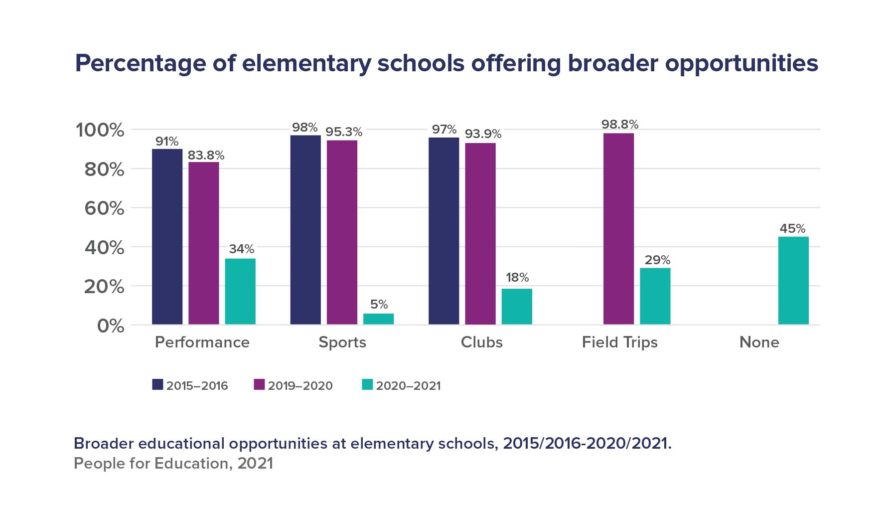Missing out - the visible and invisible loss of extracurricular activities
Extracurricular activities in Ontario schools and the fundraising that supports them, have plummeted because of COVID-19, leaving students without a crucial component of their learning. The impact is particularly hard on students from low-income families, because often school provided their only point of access to these vital experiences.
People for Education’s 2020/21 Annual Ontario School Survey shows that the vast majority of schools offered no clubs or extracurriculars at all – compared to more than 90% of schools last year. In addition, the fundraising that makes these broader opportunities possible also dropped by more than half.
While extracurricular activities dropped almost equally between low- and high-income schools, studies have shown that students in higher income families are more likely to participate in activities outside of school because of the resources available to them. Students in low-income families are less likely to have those same opportunities.
Why extracurricular activities matter – more than just frills
The clubs and sports, the plays and performances are a vital part of education now. They encourage the development of skills such as thinking creatively and critically, collaborating, communicating effectively, learning to learn, and developing a sense of self and society – these are the competencies that People for Education refers to as The New Basics.
They improve students’ well-being, their health, the sense of achievement and success. They help students explore, and engage with, a wide range of identities and interests. Studies also show that broader learning opportunities can also impact graduation, future degree attainment and employment.
It is difficult and sad that we have no special events, assemblies, sports, clubs, guest speakers or field trips to offer this year. These are the activities that make school fun and meaningful for the students. Having virtual school assemblies, for example, are a poor substitute for connecting the whole school community and encouraging school spirit. This year feels hollow and disconnected. Fundraising is affected. Our School Council is struggling to find ways to support the school.
In-person elementary, Southwest Ontario
Shifting priorities for fundraising
COVID-19 also had an impact on how money was spent. Amongst in-person and hybrid schools, 43% and 25% (respectively) reported that they had to use fundraising/donations to cover the costs of technology. Others reported buying basic necessities for vulnerable families in their communities.
Over the many years that People for Education has been following the issues in fundraising for school activities, the one constant has been inequity. Schools in higher income communities raise more money for a wider range of activities than schools in lower income communities. In 2020-2021 that gap remained, with even less money raised.
Average fundraising in high-income elementary schools
- 2019-2020: $21,260
- 2020-2021: $15,197
Average fundraising in low-income elementary schools
- 2019-2020: $10,872
- 2020-2021: $6,978
Gaps must be addressed in coming school year
While extracurricular activities may appear to be a sidecar to “normal” education, they are essential to students’ success and a bellwether indicator on how equitable and how holistic the quality of education is in Ontario.
As with many other aspects of COVID-19, the extent of the pandemic’s effect on school clubs, sports, and other opportunities remains uncertain. How has the use of fundraising dollars shifted during COVID-19 in terms of school needs and restrictions? Have these shifts widened the gap in social, cultural, and symbolic capital between students in high- and low-income schools?
Read the full report“The lack of opportunity caused by the loss of extracurricular activities will leave a gap that must be addressed when schools resume in-person, full time. We are recommending that the province convene an Educational Advisory Task Force to ensure that plans for the fall are based on the best advice and experience possible. Students’ education, and their well-being has been deeply affected by the pandemic. We must do everything we can to ensure resources are in place to address the gaps and the losses.”
Annie Kidder, Executive Director, People for Education
